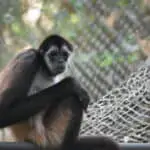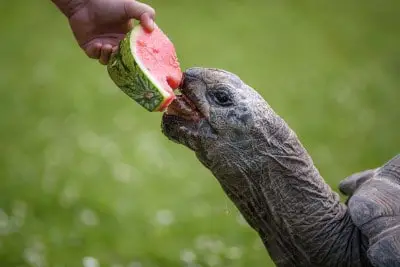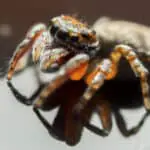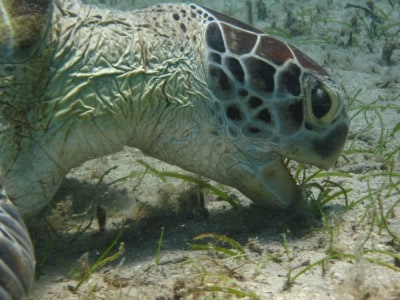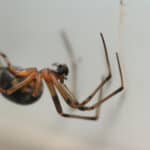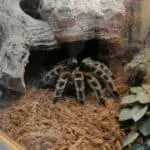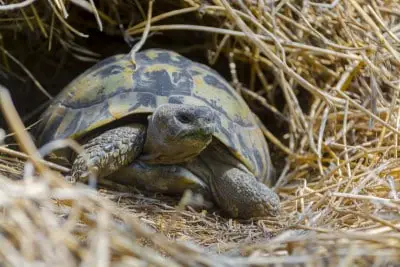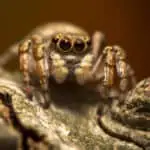Have you ever caught your cat munching on spider webs? It may seem like a strange behavior, but it’s actually not uncommon for cats to eat spider webs. In fact, there are several reasons why cats are attracted to these silky strands.
Understanding cats and their behavior is key to figuring out why they do what they do. One reason why cats eat spider webs is due to their nutritional needs. Just like humans, cats require certain nutrients to stay healthy, and they may turn to spider webs as a source of protein and carbohydrates. However, excessive consumption of spider webs could also indicate an underlying health issue, such as pica, which is a condition where cats eat non-food items.
As a cat owner, it’s important to know why your furry friend is eating spider webs and how to prevent it. In this article, we will explore the various reasons why cats eat spider webs, as well as strategies for cat owners to help keep their pets healthy and happy. So, let’s dive in and unravel the mystery behind this curious feline behavior.
Key Takeaways
- Cats may eat spider webs for nutritional reasons, but excessive consumption could indicate an underlying health issue.
- Pica is a condition where cats eat non-food items, and it’s important to consult with a veterinarian if your cat is displaying signs of pica.
- Cat owners can prevent their pets from eating spider webs by providing a balanced diet and keeping their home spider-free.
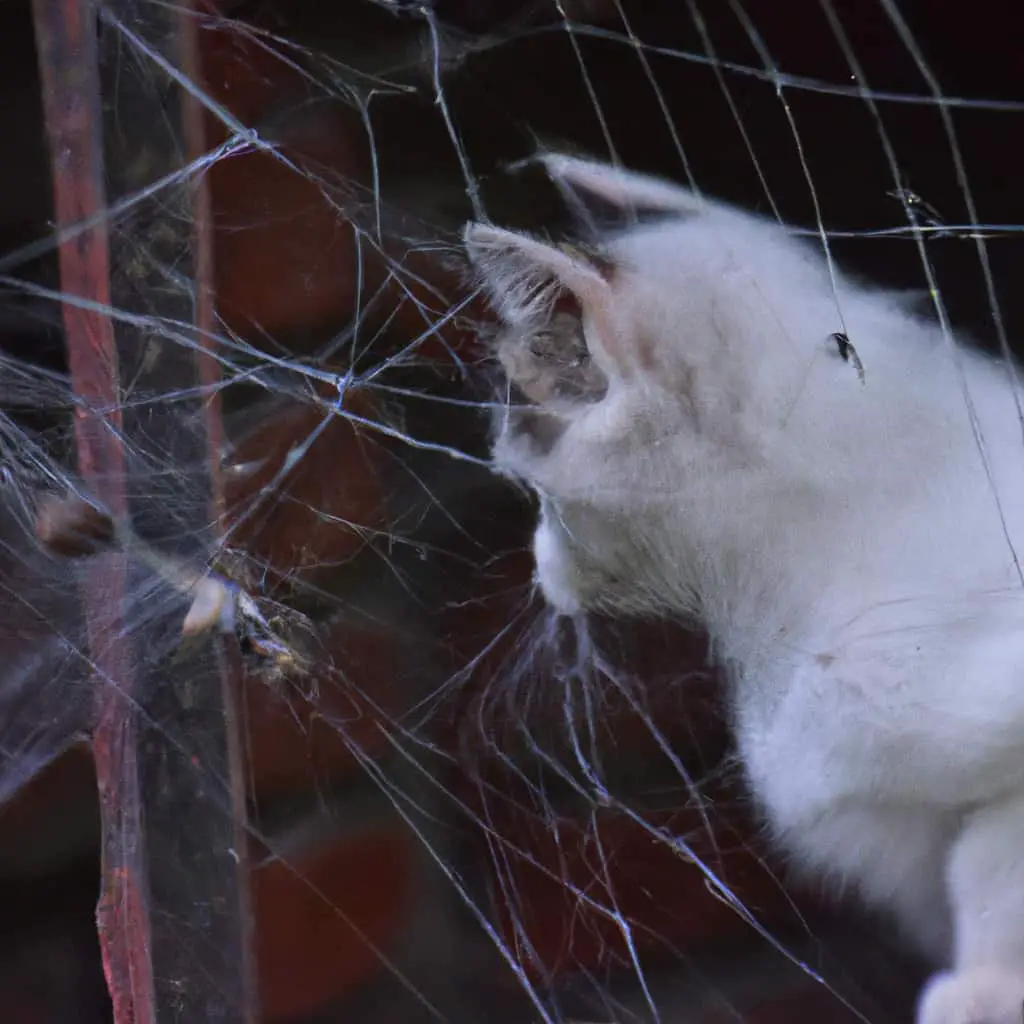
Understanding Cats and Their Behavior
As cat owners, we all know that our feline friends can be quite curious creatures. But what drives this curiosity? And how does it relate to their behavior, particularly their hunting instincts?
Cats and Curiosity
Cats are naturally curious animals. They love to explore their surroundings and investigate new things. This curiosity is driven by their innate desire to learn and understand their environment.
One way that cats express their curiosity is through play. They love to chase and pounce on toys, and they’re always on the lookout for new things to play with. This play behavior is not just for fun; it also helps cats to develop their hunting skills.
Hunting Instincts in Cats
Cats are natural hunters, and their hunting instincts are deeply ingrained in their behavior. This is why they are often attracted to things like spider webs. The texture and movement of the web mimic that of prey, which triggers the cat’s hunting instincts.
This hunting behavior is not just a fun activity for cats; it is also essential for their survival. In the wild, cats rely on their hunting skills to catch food and fend off predators. Domesticated cats may not need to hunt for their food, but their instincts are still very much intact.
In conclusion, cats are curious and instinctive animals. Their behavior is driven by their desire to learn and understand their environment, as well as their natural hunting instincts. As cat owners, it’s important to understand and appreciate these behaviors, and provide our cats with plenty of opportunities to explore and play.
Cats and Their Nutritional Needs
As a cat owner, you might wonder why your feline friend eats spider webs. While it might seem odd, cats have unique nutritional needs that they try to fulfill in various ways. In this section, we’ll explore the nutritional needs of cats and how they relate to their behavior.
Protein and Carbohydrates
Cats are obligate carnivores, which means they require a diet high in animal protein to thrive. Unlike humans, cats cannot produce certain amino acids, so they must obtain them through their diet. Protein is essential for building and repairing tissues, producing enzymes and hormones, and maintaining a healthy immune system.
While cats don’t require carbohydrates in their diet, they can still benefit from small amounts. Carbohydrates provide energy and can help regulate blood sugar levels. Interestingly, spider webs contain both protein and carbohydrates, which might explain why some cats find them appealing.
Vitamins and Minerals
In addition to protein and carbohydrates, cats require a range of vitamins and minerals to maintain optimal health. Some of the essential nutrients for cats include:
- Vitamin A: important for vision, skin health, and immune function
- Vitamin D: necessary for bone health and immune function
- Iron: essential for oxygen transport and energy production
- Taurine: crucial for heart and eye health
While cats can obtain many of these nutrients from their diet, some may require supplementation. If you’re concerned about your cat’s nutritional needs, talk to your veterinarian about the best diet and supplements for your furry friend.
Overall, cats have unique nutritional needs that they try to fulfill in various ways, including eating spider webs. By providing your cat with a balanced diet and appropriate supplements, you can help ensure they stay healthy and happy.
Pica in Cats
As mentioned earlier, cats have a tendency to eat non-food items, and this behavior is known as pica. It is not entirely clear why some cats develop pica, but it is believed that it could be due to a lack of certain nutrients in their diet or a psychological condition.
Identifying Pica
The hallmark symptom noted with pica is the actual behavior itself – chewing, sucking, or ingesting non-edible materials. Cats can also exhibit other symptoms associated with pica or its results, such as vomiting, diarrhea, lack of appetite or thirst, constipation, straining to defecate, and lethargy.
Health Risks of Pica
While eating non-food items may seem harmless, it can lead to various health problems in cats. For example, if a cat ingests wool or plastic, it can cause gastrointestinal problems, such as vomiting, diarrhea, and digestive issues. In severe cases, it can lead to an intestinal blockage, which requires immediate medical attention.
Feline pica can also be a sign of an underlying medical issue, such as hyperthyroidism or diabetes. Therefore, it is essential to take your cat to the vet if you notice any unusual behavior or symptoms.
In conclusion, while cats eating spider webs may seem strange, it is not uncommon behavior. However, if your cat is exhibiting signs of pica, it is best to take them to the vet to rule out any underlying health issues.
Why Cats Eat Spider Webs
As a cat owner, you may have caught your furry friend nibbling on spider webs. It’s a strange behavior that can be concerning, but there are reasons why cats eat spider webs.
Spider Webs as Toys
Cats are playful creatures, and spider webs can be a source of entertainment for them. The webs are delicate and easy to paw at, making them an ideal toy for cats. However, it’s important to note that spider webs can be harmful to cats if ingested.
Spider Webs as Prey
Cats are natural hunters, and spider webs can be mistaken for prey. The movement of the web can attract a cat’s attention, and they may try to capture it. However, eating spider webs can lead to health concerns.
Health Concerns
Eating spider webs can cause health problems for cats. The webs can contain harmful chemicals or insects that can be toxic to cats. Ingesting the web can also lead to vomiting, diarrhea, swelling, anemia, and lethargy. If your cat has eaten a spider web, it’s important to take them to the vet for a check-up.
One reason why cats eat spider webs is due to a nutrient deficiency. Spider webs contain protein, carbohydrates, and nucleic acids that can be beneficial to cats. However, it’s important to ensure that your cat is receiving a balanced diet to prevent nutrient deficiencies.
In conclusion, while cats may be attracted to spider webs as toys or prey, it’s important to monitor their behavior and ensure their safety. If you notice your cat eating spider webs or experiencing health problems, it’s best to consult with your veterinarian.
Strategies for Cat Owners
As a cat owner, you want to ensure your feline friend is healthy and happy. Here are some strategies to prevent your cat from eating spider webs:
Providing a Stimulating Environment
Cats are curious creatures and need plenty of stimulation. Provide your cat with a variety of toys and activities to keep them entertained. Consider purchasing interactive toys that mimic prey, such as feather wands or laser pointers. Cat trees and scratching posts can also provide a source of entertainment and exercise for your cat.
Ensuring a Balanced Diet
Cats may eat spider webs due to nutritional deficiencies. Ensure your cat is receiving a balanced diet that includes high-quality protein sources, such as meat or fish. Consider incorporating grass into their diet, which can help with digestion. Additionally, speak with your veterinarian about incorporating supplements, vitamins, and minerals into your cat’s diet if necessary.
Avoid giving your cat treats that are high in carbohydrates or fillers, as these can contribute to nutritional imbalances. Stick to treats that are made with high-quality ingredients and are specifically formulated for cats.
By providing your cat with a stimulating environment and a balanced diet, you can help prevent them from eating spider webs and ensure their overall health and safety.
Frequently Asked Questions
Can cats get sick from eating spider webs?
Yes, cats can become sick from eating spider webs. Spider webs can contain insects that can carry parasites or other organisms that can make your cat ill. Additionally, eating too much webbing can cause digestive issues such as vomiting or diarrhea.
Is it normal for cats to eat spider webs?
While it may seem unusual, it is not uncommon for cats to eat spider webs. Cats are naturally curious and playful creatures, and they may find spider webs interesting to investigate or play with.
What should I do if my cat eats spider webs?
If your cat has eaten spider webs, it is important to monitor their behavior and watch for any signs of illness. If your cat shows any symptoms such as vomiting, diarrhea, or lethargy, you should contact your veterinarian for advice.
Why do cats have a tendency to eat non-food items?
Cats have a natural tendency to explore their environment with their mouths, which can sometimes lead to them eating non-food items. This behavior is known as pica and can be caused by a variety of factors, including boredom, anxiety, or nutritional deficiencies.
What is pica in cats and how does it relate to eating spider webs?
Pica is a condition in which cats eat non-food items, such as spider webs. This behavior can be caused by a variety of factors, including stress, anxiety, or nutritional deficiencies. If your cat is regularly eating non-food items, you should consult with your veterinarian to determine the underlying cause and develop a treatment plan.
Can eating spider webs harm cats in any way?
Yes, eating spider webs can harm cats in several ways. In addition to the risk of ingesting parasites or other harmful organisms, eating too much webbing can cause digestive issues such as vomiting or diarrhea. If your cat is regularly eating spider webs, it is important to consult with your veterinarian to ensure that they are not experiencing any health problems.

